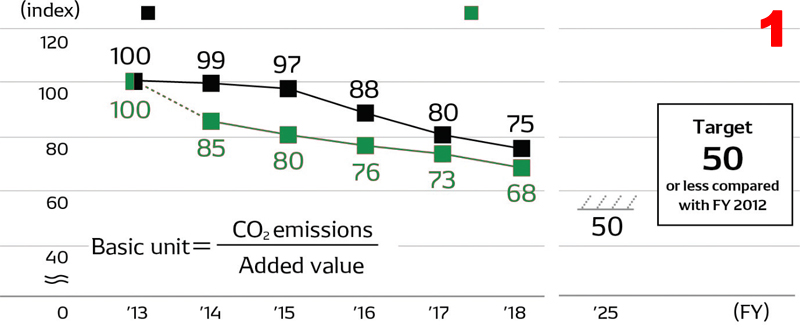
Times are changing, and with the world being more ecologically aware than it ever has before, what is the aftermarket doing to aid in this global cause? PMM talks to Denso to find out about what is going on at a supplier level.
In 2050, the global population is predicted to be as many as nine billion people. To handle all the CO2 and waste created, we will need the equivalent of four planets.
But of course, we only have one. So, what can be done? In 2015, the United Nations adopted the Sustainable Development Goals (SDGs) and in 2016, agreed the implementation of the Paris Agreement. Governments around the world are striving to make changes to protect the environment. Corporations have an important role to play too – taking steps to contribute to the sustainable development of society at large.
How is Denso responding to this situation?
Denso parts are used in cars and trucks all over the world. The company knows it bears great responsibility towards the earth’s environment and population.
Throughout its history, Denso has developed advanced technologies and worked to minimise negative environmental and societal impact. Today, there are two important initiatives that set out how the company intends to become more sustainable: its Eco Vision 2025 and Longterm Policy for 2030. This article provides a brief overview of each, and highlights Denso’s key initiatives for a greener future.
Eco Vision 2025
Eco Vision is reformulated every 10 years, as a long-term commitment towards environmental management and policies pursued by the group. An Environmental Action Plan is formulated every five years to embody the commitments and environmental policies established in the Eco Vision.
The vision for 2025 is based around three key targets: Energy 1/2, Clean x2, and Green x2. It aims to meet these targets by implementing 10 actions relating to product development, production sites, associates and management.
Energy
Denso is aiming to cut CO2 emissions by half with technologies that resolve global warming, energy and resource issues.
Product use represents the stage with the highest CO2 emissions in the vehicle lifecycle. To help prevent global warming, it is important to increase fuel efficiency through the use of lightweight designs in automotive parts and ensure high combustion efficiency; for example, the company’s new power control units and starter motors are smaller and more lightweight than previous parts.
Within product development, the company will contribute to reducing CO2 emissions from vehicles through the development of new technologies and products that improve fuel consumption and are compatible with a variety of fuels. In addition, there will be implementation of energy management initiatives, which enable the recovery and reuse of heat energy emitted from vehicles and kinetic energy lost when decelerating.
Thanks to energy-saving improvements, Denso is currently on track to reduce its CO2 emissions index to 50 by 2025. (Fig 1)

Clean x2
Denso wants to reduce the impact of environmentally hazardous substances, emissions and waste by half, as well as contribute to improved air quality by cutting vehicle emissions.
One of the initiatives planned links to resource recycling via an expanding parts rebuilding business, which is focused on product reconditioning (rebuilding), parts reuse and material recycling.
Through its efforts to minimise levels of waste (including chemical substances) and reduce the amount of water used within its factories, Denso has established a Safety and Environmental Management Standard, which is more stringent than the environmental regulations in the countries and regions in which it operates. This helps the company identify hypothetical environmental risks, such as environmental accidents, pollution, and legal violations.
It is vital that its employees are fully engaged with its environmental goals, and the company conducts training and events in an effort to foster environmental awareness.
Green x2
Denso aims to double its green activities with programmes such as biofuel research and the creation of green spaces and communities.
To minimise environmental destruction from resource extraction, Denso is focused on the development of alternative fuels and raw materials using biological resources that carefully take biodiversity into account, including the commercialisation of a plant-derived plastic radiator tank, working with businesses that make use of algae, and expanding research on biofuels.
In cooperation with local communities, the company is engaged in the maintenance and preservation of ecosystems. The group as a whole has been working with local communities to promote the Denso Green Project since 2006, with the goal of restoring and preserving local environments inhabited by a variety of plant and animal life. (Fig 2)

Long-term Policy for 2030
The company’s Long-term Policy for 2030 sets out its goal for the future, its principles, the business environment and approach. The policy’s slogan is ‘Bringing hope for the future for our planet, society and all people’.
Denso aims to continue to contribute to a sustainable society by providing value related to two key themes: ‘green’ and ‘peace of mind’. As part of its ‘green’ theme, the company plans to develop and promote products that help reduce environmental burden, such as products for electric vehicles, thereby aiming to decrease CO2 emissions. As part of its ‘peace of mind’ theme, it plans to also accelerate the development and promotion of products related to advanced safety and automated driving technologies.
Sustainable Development Goals
This policy sets out the main social issues that Denso wants to address (defined by the UN’s Sustainable Development Goals) and which areas of the business will be involved in working towards them.
Key goals to be achieved include:
- Good health and well-being: ensure healthy lives and promote well-being for all at all ages
- Affordable and clean energy: ensure access to affordable, reliable, sustainable and modern energy
- Industry, innovation and infrastructure: build resilient infrastructure, promote inclusive and sustainable industrialisation and foster innovation
- Sustainable cities and communities: make cities and human settlements inclusive, safe, resilient and sustainable
- Responsible consumption and production: ensure sustainable consumption and production patterns
- Climate action: take urgent action to combat climate change and its impacts









